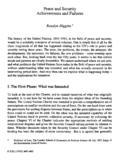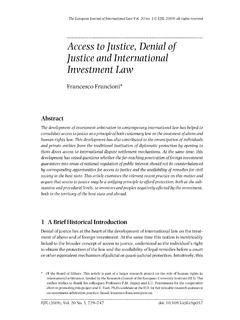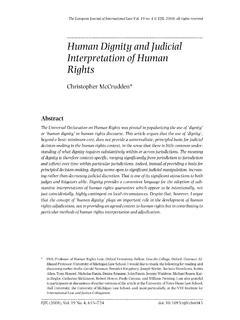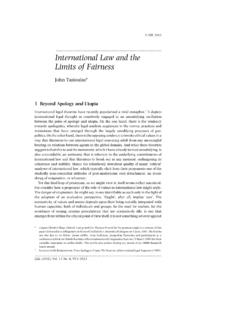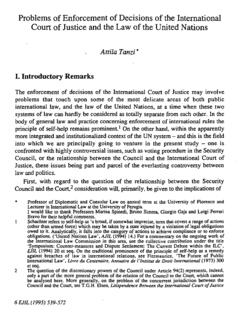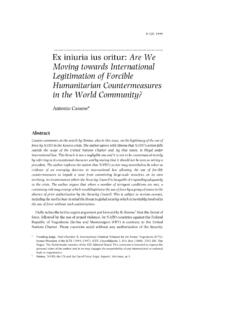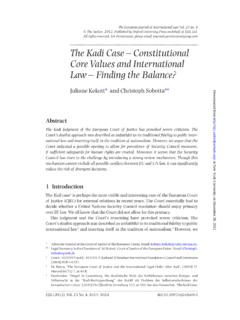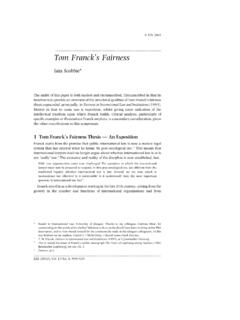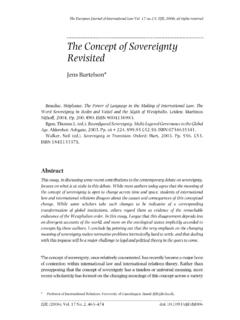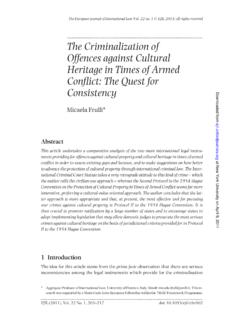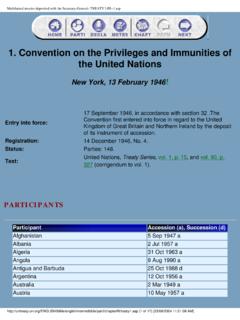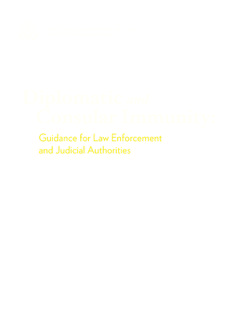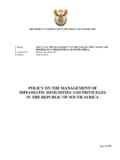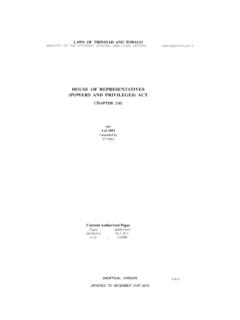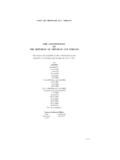Transcription of Immunities of State Officials, International Crimes, and ...
1 The European Journal of International Law Vol. 21 no. 4 EJIL 2011; all rights (2010), Vol. 21 No. 4, 815 852doi: of State officials , International Crimes, and Foreign Domestic CourtsDapo Akande* and Sangeeta Shah**AbstractThis article examines the extent to which State officials are subject to prosecution in foreign domestic courts for International crimes. We consider the different types of immunity that International law accords to State officials , the reasons for the conferment of this immunity and whether they apply in cases in which it is alleged that the official has committed an International crime . We argue that personal immunity (immunity ratione personae) con-tinues to apply even where prosecution is sought for International crimes. Also we consider that instead of a single category of personal immunity there are in fact two types of such immunity and that one type extends beyond senior officials such as the Head of State and Head of Government.
2 Most of the article deals with functional immunity (immunity ratione materiae). We take the view that this type of immunity does not apply in the case of do-mestic prosecution of foreign officials for most International crimes. However, we reject the traditional arguments which have been put forward by scholars and courts in support of this view. Instead we consider the key to understanding when functional immunity is available lies in examining how jurisdiction is conferred on domestic IntroductionThe development of substantive norms of International human rights and inter-national criminal law has not been matched by the development of mechanisms and * University Lecturer in Public International Law & Co-Director, Oxford Institute for Ethics Law and Armed Conflict, University of Oxford; Yamani Fellow, St Peter s College, Oxford. Email: Lecturer in Law, University of Nottingham. Email: at New York University on February 1, from 816 EJIL 21 (2011), 815 852procedures for their enforcement.
3 The primary methods of judicial enforcement envis-aged by International law are the domestic courts of the State where the human rights violation or International crime occurred and the courts of the State responsible for that violation. To this end, International law imposes obligations on states to pros-ecute those who have committed International crimes within their territory. Likewise human rights law includes a right to a remedy or to reparation provided by the State that has violated the substantive human right. However, these methods of enforce-ment of human rights and International criminal law often fail. Domestic law may not incorporate the relevant International human rights norm. International crimes are often committed by State agents as part of State policy, and so governments do not rou-tinely prosecute their own officials engaged in such action (though, as has happened in Latin America, changes of government may bring a change of policy and prosecu-tions for past official conduct).
4 All of this has led to what has been described as a culture of impunity which contributes to a climate in which human rights violations persist and are not de-terred. In order to counter this culture, there are two other possible fora where ju-dicial enforcement of human rights norms may take place. First, it is possible that such enforcement takes place in International (including regional) courts: such as the human rights tribunals or quasi-judicial bodies dealing with State respon-sibility or International criminal tribunals dealing with the penal responsibility of individuals. However, enforcement of human rights norms by such courts is limited, inter alia, by the fact that an International court with jurisdiction over the acts in question may not exist. For this reason, some human rights advocates have turned to the second set of fora (other than the domestic court of the State com-mitting the wrong): the domestic courts of other states .
5 For the domestic courts of other states to serve as fora for the transnational enforcement of human rights and International criminal law a number of hurdles will have to be overcome. Some of these hurdles are practical, such as the difficulty of obtaining evidence in relation to crimes that took place abroad and the lack of motivation on the part of prosecutors in other states to take up cases which have no connection with the country. Other hurdles are those to be found in the domestic law of the State , in-cluding jurisdictional limits under domestic criminal law or under the conflict of law rules of the forum (doctrines such as forum non conveniens). However, there are at least two International law hurdles that also have to be overcome. It will have to be established that the foreign State has jurisdiction, as a matter of International law, to prescribe rules for the matter at hand and to subject the issue to adjudica-tion in its courts.
6 Also, where a case is brought in a domestic court against a for-eign State or foreign State official or agent, it must be established that the State or its official is not immune from the jurisdiction of the forum. There are recent devel-opments suggesting movement in International law on both of these issues, but the precise contours of the relevant rules are yet to be conclusively article addresses the last of the obstacles identified: the International law rules on the immunity of State officials . Whilst it is commonly accepted that State officials are immune in certain circumstances from the jurisdiction of foreign at New York University on February 1, from Immunities of State officials , International Crimes, and Foreign Domestic Courts 817states,1 there has been uncertainty about how far those Immunities remain applic-able where the official is accused of committing International crimes. Examining the rationale for the conferment of each of these types of immunity, as well as their scope, this article determines whether they remain applicable in criminal proceedings in which an official is accused of committing a crime under International law.
7 Section 2 of this article examines the immunity that attaches to certain State officials as a result of their office or status (immunity ratione personae). It is argued that there are in fact two types of immunity ratione personae: those attaching to a limited group of senior officials , especially the Head of State , Head of Government, and diplomats, and the im-munity of State officials on special mission abroad. Section 3 addresses the immunity which attaches to acts performed by State officials in the exercise of their functions (immunity ratione materiae). We argue that this immunity has both a substantive and a procedural function, in that it gives effect to a defence available to State officials and prevents the circumvention of the immunity of the State . In that part, we consider, and reject, a number of related arguments which are normally deployed in arguing that immunity ratione materiae does not apply to cases concerning human rights vio-lations in general and International crimes in particular.
8 The arguments in question are based on the jus cogens status of the norms in question or on the view that human rights violations/ International crimes may not be considered sovereign (or official) acts. In our view, these arguments misunderstand the basis on which immunity is accorded or are premised on a false conflict of norms. We then go on to suggest a more persuasive rationale for the argument that immunity ratione materiae does not apply in cases concerning prosecutions for International crimes. In so doing, we re-examine the relationship between jurisdictional rules and rules of immunity and suggest that rules conferring extra-territorial jurisdiction may of themselves displace prior im-munity rules. Our conclusion considers why it is important to clarify the rationale for denial of immunity ratione materiae and briefly explores some of the implications of our theory for civil cases involving human rights violations. Some of the arguments set out in this article were first summarized by one of us in a previous The present article explores the arguments in more detail, filling in some of the steps in the reason-ing and elaborating on some of the points made and their See, generally, Whomersley, Some Reflections on the Immunity of Individuals for Official Acts , 41 ICLQ (1992) 848; Tomonori, The Individual as Beneficiary of State Immunity: Problems of the Attribution of Ultra Vires Conduct , 29 Denver J Int l L and Policy (2001) 261; H.
9 Fox, The Law of State Immunity (2nd edn, 2008), at 455 464 and Ch. 19; Watts, The Legal Position in International Law of Heads of states , Heads of Governments and Foreign Ministers , 247 Recueil des Cours (1994-III) 13; Wickremasinghe, Immunities Enjoyed by officials of states and International Organizations , in M. Evans (ed.), Inter-national Law (3rd edn, 2010), at Akande, International Law Immunities and the International Criminal Court , 98 AJIL (2004) 407, 409 415. at New York University on February 1, from 818 EJIL 21 (2011), 815 8522 Immunity of State officials Ratione Personae (Immunity Attaching to an Office or Status) International law confers on certain State officials Immunities that attach to the office or status of the official. These Immunities , which are conferred only as long as the official remains in office, are usually described as personal immunity or im-munity ratione personae . It has long been clear that under customary International law the Head of State and diplomats accredited to a foreign State possess such immun-ities from the jurisdiction of foreign In addition, treaties confer similar immun-ities on diplomats, representatives of states to International organizations,4 and other officials on special mission in foreign The predominant justification for such Immunities is that they ensure the smooth conduct of International relations and, as such, they are accorded to those State officials who represent the State at the inter-national level.
10 International relations and International cooperation between states require an effective process of communication between It is important that states are able to negotiate with each other freely and that those State agents charged with the conduct of such activities should be able to perform their functions without harassment by other As the International Court of Justice (ICJ) has pointed out, there is no more fundamental prerequisite for the conduct of relations between states than the inviolability of diplomatic envoys and embassies .8 In short, these im-munities are necessary for the maintenance of a system of peaceful cooperation and co-existence among Increased global cooperation means that this immunity is especially See Watts, supra note , Arts 29 and 31 Vienna Convention on Diplomatic Relations 1961 (VCDR), 500 UNTS 95; Art. IV, Section 11, Convention on the Privileges and Immunities of the United Nations 1946, 1 UNTS 15 and 90 UNTS 327 (corrigendum to vol.)
